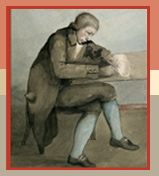
Iolo's Life
Autobiographical material (NLW 21387E)
The Agricultural Observer and Farmer
Iolo Morganwg: the Political Radical
Newgate prison in London was one of the most notorious jails in Britain. During the so-called 'reign of terror' in the 1790s the number of political dissidents detained there increased appreciably. Among them was the Baptist minister, William Winterbotham, who was incarcerated for seditious preaching. Iolo used to visit him and famously signed himself in the visitors' book as 'Bard of Liberty', an appellation which he proudly used in his writings.
Iolo was one of Wales's first political democrats. He knew Richard Price, struck up friendships with David Williams, George Dyer and William Godwin, and reckoned that Tom Paine's Rights of Man was the finest charter of individual and collective liberty the world had ever seen.
Whilst organizing the publication of his Poems, Lyric and Pastoral (1794), Iolo became heavily involved in the political activities of London-Welsh societies, in fostering republican views in Gorsedd ceremonies, and in defending the rights of persecuted Dissenters and freeborn Welshmen. He often styled himself 'Jacobin', 'Citizen' and 'Theocrat', and penned dozens of forthright, satirical and subversive essays and poems. He came close to being jailed himself for seditious libel. On his return to the Vale of Glamorgan in 1795 he was kept under surveillance, especially when he used his Cowbridge bookshop and grocery to support anti-slavery, fair trade and Jacobinism.
Iolo denounced 'kingcraft' and 'priestcraft', thundered against war and injustice, and never tired of proclaiming the benefits of 'Breiniau Dyn' (the Rights of Man). A political animal to the core, he played a prominent part in raising the profile of libertarian causes in Wales and in spreading subversive democratic ideas through his Unitarianism, neodruidism and bardic activities. His commitment to political liberty remained strong until his death in 1826 and the memory of this 'rebel Druid' cast a long shadow over the nineteenth century.

